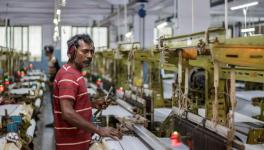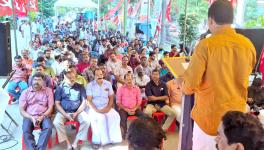COVID-19 in Rural India-XXXIV: In Malappuram, Community Kitchens Come to Rescue of Workers as MGRNREGS Work Comes to Halt
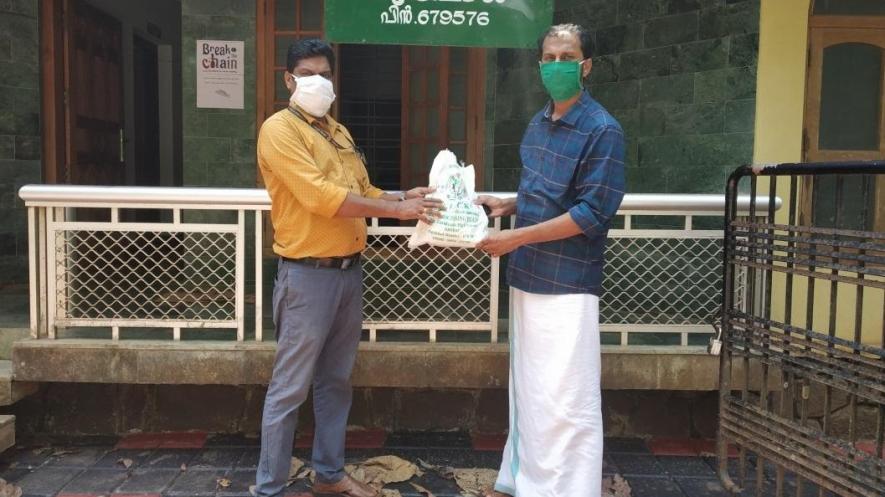
Households have received vegetable seeds free of cost from a rapid response team constituted at the ward level.
This is the 34th report in a series that provides glimpses into the impact of COVID-19-related policies on life in rural India. The series, commissioned by the Society for Social and Economic Research, comprises reports by various scholars who have been conducting village studies in different parts of India. The reports have been prepared on the basis of telephonic interviews with key informants in their study villages. This report talks about the impact of the lockdown on the rural employment and agriculture in Edappal panchayat in Kerala’s Malappuram district. Even though farmers faced problems in the initial phase, the state government’s support and procurement policies helped them to tide over the crisis while rural employment has been significantly affected by the lockdown.
Edappal Grama Panchayat is located in the south-western region of Malappuram district, Kerala. The panchayat covers an area of about 23.70 sq. km and its boundaries are a few km from the shore of the Arabian Sea. There are about 3,950 households in the panchayat, of which about 2,052 households are dependent on agriculture. There are 802 marginal farmers, 1,200 small farmers and 50 large farmers. The remaining households derive their income mainly from agricultural labour, construction work, distribution, unskilled manual work and the running of retail shops.
The soil types found in the area predominantly are laterite and sandy loam. The major crops cultivated in Edappal are coconut, paddy, arecanut and banana. Most farmers manage to grow three paddy crops a year; the main paddy crop is the one grown in the third season (puncha), i.e., between December and April. Some farmers also cultivate a vegetable crop between November and May. Paddy and vegetable crops require relatively more labour than other crops. Paddy-related agricultural operations are mainly carried out through farmer societies called padasekarams. These registered societies organise agricultural operations such as ploughing, nursery preparation and so on. The labour engaged to perform these tasks is mainly (between 60-70%) migrant labour brought in from states like Tamil Nadu and West Bengal.
COVID-19 Lockdown Impact on Agriculture
The state government of Kerala declared a lockdown on March 23, 2020. This put a stop to the movement of people, vehicles and agricultural machinery in the state. At the time, labour-intensive operations such as fertiliser and pesticide application and harvest-related activities were underway in Edappal and across Kerala. Immediately after the lockdown was declared, many of the migrant workers performing these activities rushed to return to their home states, while those who remained were unable to travel to their places of work. This affected the timely completion of agricultural operations. Also, fertiliser and pesticide shops remained closed during the first few weeks of the lockdown. This created a shortage of agricultural input supplies in the panchayat. At the same time, movement restrictions meant that people had more time to spend on homestead farming, which led to a spike in demand for seeds and planting materials, especially vegetable seeds. However, the major seed distributing agencies remained closed, so residents of the panchayat were unable to carry out homestead farming at the desired levels.
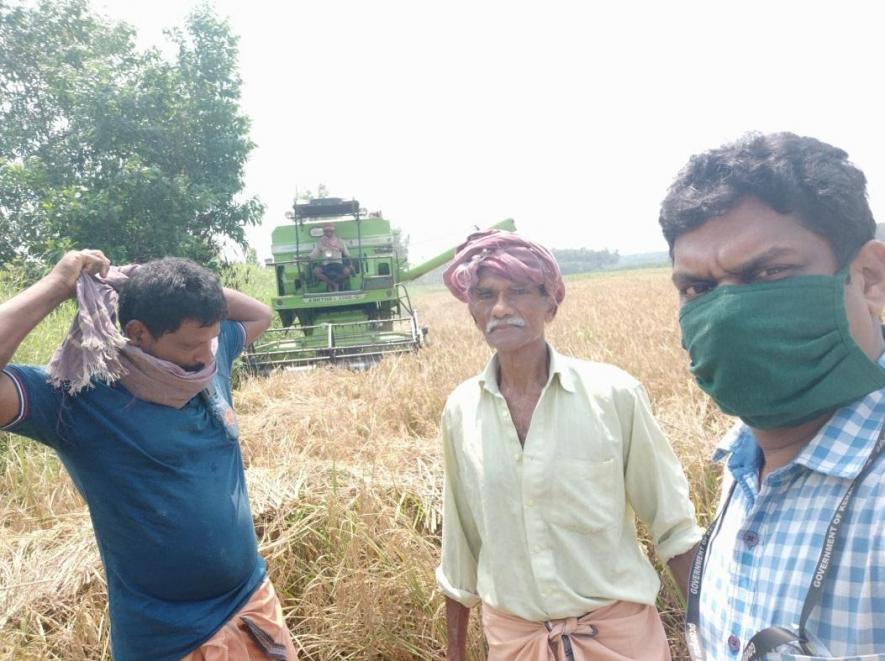
As of mid-April, harvesting operations had begun in Edappal.
About 420 hectares of paddy was ready for harvesting in the second week of April. The timely harvesting of the paddy crop is crucial, as much of the land used for paddy cultivation in this region lies below the mean sea level (kole land). This means even a small bout of rain could submerge a field and result in the loss of an entire crop. Harvesting is mainly carried out using combine harvesters that are brought in from other states. Due to the lockdown, these combine harvesters and their operators have not been able to travel to the region. There is also an acute shortage of labour in agriculture and allied sectors owing to the inability of casual and migrant workers to travel into and within the state. However, on April 3, 2020, the state government of Kerala declared that harvesting operations are essential services, which has alleviated the crisis to some extent. Vehicles and workers who are engaged in harvesting operations are now allowed to travel as long as they take the precautions suggested by the health authorities. As of mid-April, harvesting operations had begun in Edappal.
Marketing has also been affected by the restrictions on movement during the lockdown. Farmers were unable to transport their produce to markets where they would get better rates than they would locally. However, the state’s Agriculture Department has proactively utilised existing market systems such as eco shops (shops that give farmers a premium price for organic produce and sell environmentally friendly agricultural inputs), weekly markets and Farmer Retail Outlets (FROs) to procure and sell produce. Fruits and vegetables produced by various groups, including joint liability groups, farmers’ groups, and individual farmers, are also collected at community kitchens and at the procurement centres of the state agency, Horticorp.
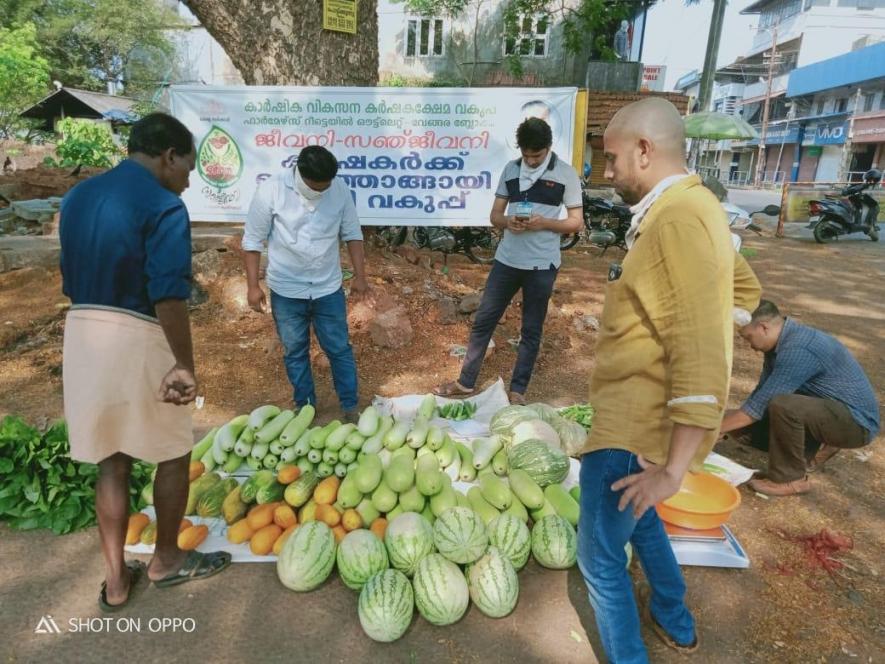
A Farmer Retail Outlet in Edappal.
As the number of cattle in Edappal panchayat is low, the lockdown has not had much impact on the small number of dairy farmers here. Milk produced within the panchayat is supplied to nearby households. Fish and meat are, however, available only in very limited quantities during the lockdown. Sufficient quantities of food grains and vegetables were available during the early days of the lockdown, but there was a noticeable drop in the number of the buyers, and sales fell due to the restrictions on people’s movement. The market rates of commodities such as pulses, onion and garlic that come from outside Kerala have risen by 10-20% and the rates of fish by 60-70%.
Rural Employment
Construction, the sector that provides the most jobs, has been shut down completely during the lockdown. Retail shops selling textiles, ‘fancy’ goods such as toys and stationery, and mobile phones have also remained closed as have repair workshops, service centres, IT-related services (internet cafes, prepaid mobile recharge shops). This has led to a shrinking of employment opportunities and job loss in all sectors, which in turn has led to income loss and lower purchasing power in the panchayat. Mahatma Gandhi National Rural Employment Guarantee Scheme (MGNREGS) workers did not receive any work during the lockdown, and the payment of wages for work done prior to this period has been delayed.
Government Support
The local governments in Kerala have been actively trying to mitigate the impact of the lockdown. Community kitchens at the panchayat and ward levels have been serving low cost (Rs 20 per meal) or free meals to poor families and migrant labourers since March 30, 2020. Local self-government institutions like the Grama Panchayats, Block Panchayats and District Panchayats are engaged in ensuring that food supplies are available and in promoting awareness about COVID-19. Through the public distribution system, the state government is providing 15-35 kg of rice free of cost, depending on the number of members in each household, to all ration card holders. Those who do not have ration cards are being given similar quantities of free rice based on a declaration submitted by family members. Households have received vegetable seeds free of cost from a rapid response team constituted at the ward level.
Senior citizens in Edappal who are unable to leave their homes during the lockdown are being helped by ASHA workers or anganwadi workers, who procure medicines for them.
Beneficiaries receiving pensions from the Welfare Fund Board and social security pensions have received their pension payments up to April 2020, i.e., one month in advance. During the lockdown, in order to prevent crowding and to maintain social distancing, employees of the Service Co-operative Banks visit pensioners’ homes to deliver cash to them. Similarly, the local post office in Edappal has also put in place an arrangement to help people withdraw cash from their bank accounts during the lockdown with no additional charge. Since April 3, people in Edappal have been able to withdraw up to Rs 10,000 using this facility; however, it is only available to those with Aadhaar-linked, public sector bank accounts. To withdraw cash, the account holders call the post office during working hours and states their account number and the amount they wish to withdraw. A postman/woman then comes to their home with an authenticating device, into which the account holder inputs an OTP received on their phone.
To conclude, the slowing down or cessation of economic activities during the lockdown have had a palpable impact on the employment opportunities available to workers in Edappal. This is likely to lead to an economic crisis not only in Mallapuram and the rest of Kerala, but also in large parts of the country.
[This report is based on information gleaned from the author’s conversations with farmers, agricultural workers and other residents in Edappal panchayat between April 3 and April 16, 2020.]
The author is an agricultural officer in the Edappal panchayat.
Get the latest reports & analysis with people's perspective on Protests, movements & deep analytical videos, discussions of the current affairs in your Telegram app. Subscribe to NewsClick's Telegram channel & get Real-Time updates on stories, as they get published on our website.

















